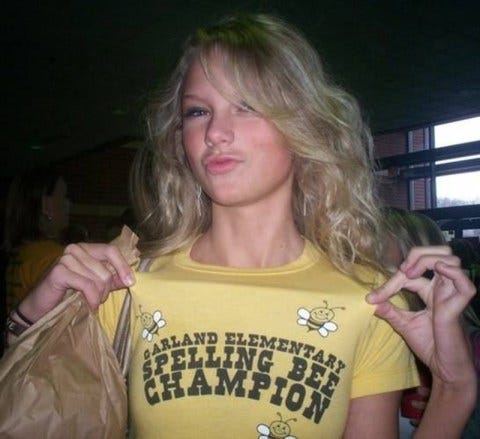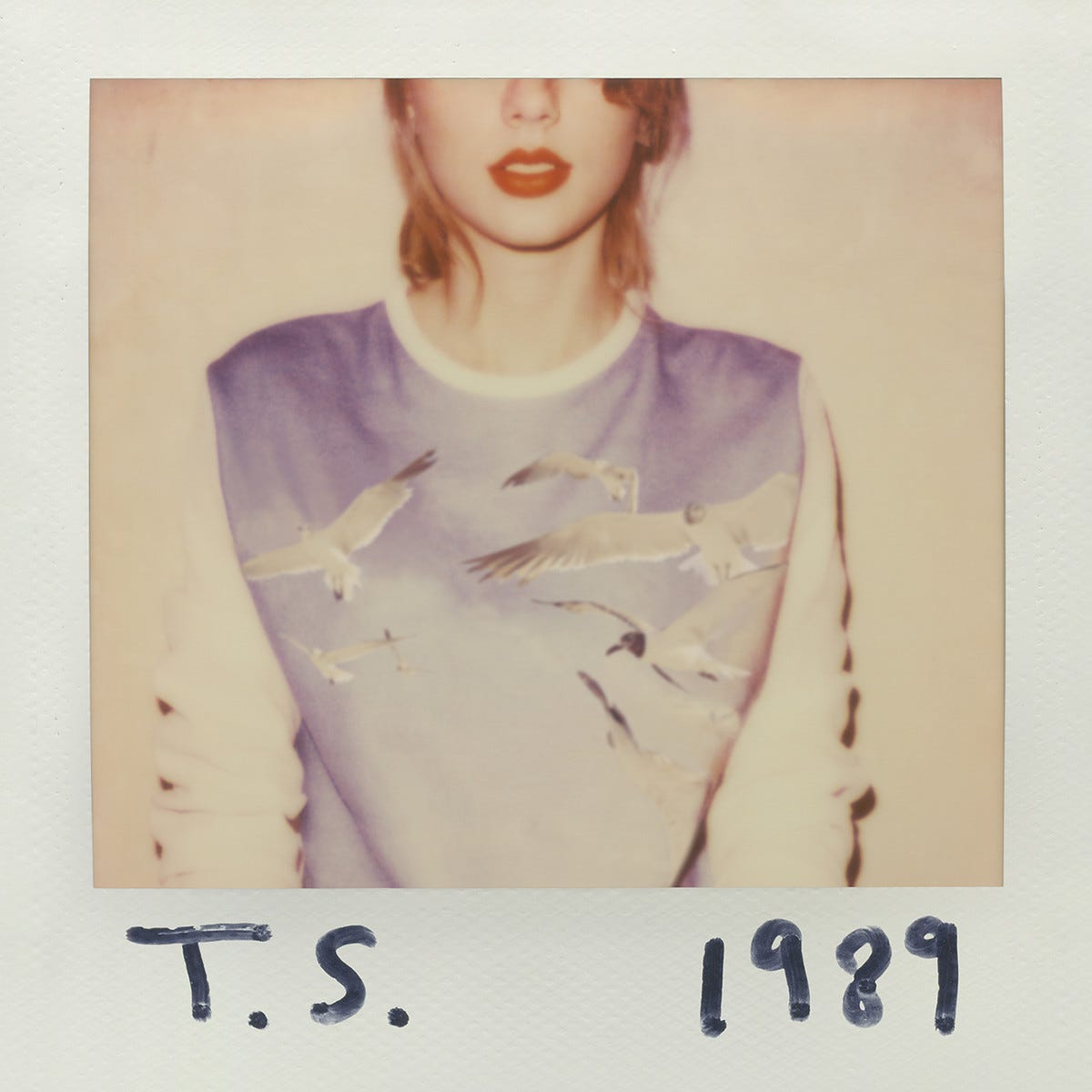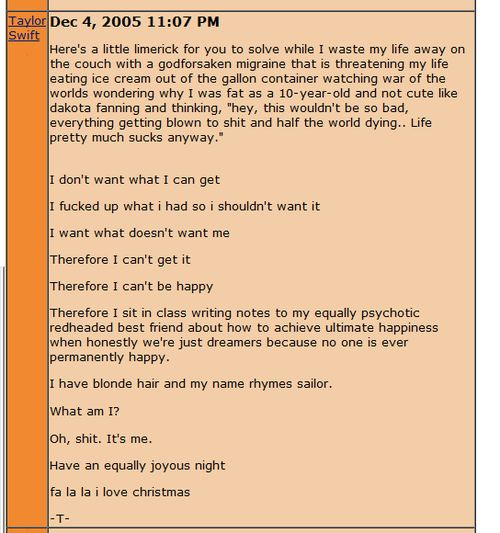Mastermind
Everything's coming up Swift
Almost a decade ago, a 23 year old Taylor Swift released her fifth studio album: 1989. The album, named after the year she was born, marked a radical departure from her typical all-American country tunes. Helmed in large part by Swedish pop producer Max Martin, Swift’s signature diaristic songwriting and simple acoustic arrangements transformed into pop bangers about shaking off the haters, guaranteed to blast through the speakers of your local supermarket and fill up stadium seats. She ditched the long, dirty blonde lion’s mane of curls she had, chopping it off in favor of a bob with a sweeping bang. She moved to Manhattan and formed an entourage of sorts, often seen out on the town, her arms interlocked with other high-profile women like Selena Gomez, Lena Dunham, and Karlie Kloss. Her lyrics became more adult. The cherry on top of it all was 1989’s album cover: a warm-toned Polaroid photograph in which half of Swift’s face is cut off at the top border, a stark contrast to the glossy, high-production album art that came before. She was making it clear—this new era would be a complete reinvention.
At that point in her career Taylor was no stranger to changes in her style through each album cycle. Her self-titled debut, to my ears, is as country as country can get; I rarely ever revisit it. Fearless had her writing become more hook-y, birthing her first hits, “Love Story” and “You Belong with Me.” Speak Now contains radio-digestible rock elements in the vein of early Paramore. Red is where she first straightened her hair and dipped her toes into the waters of streamlined electro-pop, although she limited the experimentation to only three tracks. All of the changes leading up to the rollout of 1989 signaled something different from the previous changes that made each era distinct, though. It was clear that she had one goal in mind: to become the biggest pop star in the world.
Her wish would become fulfilled. Every single off of 1989, bar “Out of the Woods” and “New Romantics,” was an inescapable hit. It was the most successful pop era since Katy Perry’s Teenage Dream. Taylor Swift and her music was everywhere; a dark, monolithic storm cloud of a pop star looming over your head wherever you went.
1989 is where I became a Swiftie. I prided myself in my ‘edgy’ music taste back then, which mostly consisted of the pop-disguised-as-alt music of Charli XCX, Lana Del Rey, and the artist formerly known as Marina and the Diamonds. I was different from most everyone I knew in that I hated everything that played on the radio. Taylor’s songs were irresistible, though. “Blank Space” isn’t just catchy, but well-written with a strong concept that’s become iconic. “Wildest Dreams” is supreme Lana Del Rey pastiche, and I still live for it. I find the sound and words of “Style” to be incredibly evocative of a thrilling doomed romance with a bad boy that’s never even happened to me—any Swiftie knows that Swift’s strongest quality as a musician is how she sets a scene. My favorite tracks off of 1989 aren’t even singles: “I Know Places,” “You Are In Love,” and “Clean” exemplify Swift’s skill at crafting a pop song with the perfect amount of depth to be relatable to the average American teenager, most of which, at the time of 1989’s release, were yearning to break free from suburbia and live an unpredictable and romanticized adult life much like the one depicted through Taylor’s songs and their Tumblr dashboards. And honestly, I just think those three songs are really beautiful. Listening to them now feels just as breathtaking as it did to me nine years ago.
It’s funny to think about how oversaturated with Taylor Swift everything was during the original 1989 release compared to now. She’s somehow become even bigger! My mom, who used to get aggravated every time one of her songs would play on the radio, asked me a few months ago if I wanted to go to the Eras Tour with her. The most random people I know who had never called themselves fans have gone to her shows, some on multiple dates. Her album sales have inflated with each release. She’s amassing so many loyally devoted followers and so much success it feels overwhelming, like the word ‘phenomena’ isn’t big enough to describe it. Every time I opened TikTok in the last month, there happened to be a Taylor Swift concert taking place at the same time, and every single livestream recommended to me was a view of the concert from a different spot. It’s perplexing because, to me, Taylor Swift has been the biggest pop star in the world since 1989. She’s only grown and, for better or worse, continues to.
Today, when we’re presented with Taylor Swift, we aren’t presented with an artist, but with a brand/franchise/monopoly. To enjoy Taylor Swift in 2023 is to be familiar with not only the hit songs in her discography, but the deep-cuts. The lore. The woman. Swift has commodified her life in a way that can only be compared to the Kardashians, the men of The Beatles or Michael Jackson, yet in an entirely different manner. Like, if you talk to someone you know who enjoys her music, you’ll find that there is no such thing as the casual Taylor Swift listener. Her fans worship her at her feet. Most of them brush her mistakes under the rug. They have inside jokes with Taylor as if she’s their best friend. They own all of her albums on several formats and rank them from best to worst, they theorize what songs are about which ex, some spend time speculating on, fully believing in and promoting a deluded view of her sexuality like it’s their business, and others spend time harassing people who slander her. They make themselves look ridiculous picking apart every single one of her social media posts looking for clues as to what the next release will be, except for when they’re proven correct. Most importantly, they flaunt Swift’s sales, streaming numbers, and achievements with pride. I’ve opened and closed the Twitter app at the sight of a Swiftie lifting Taylor up to put down another woman based on her numbers alone more times than I’ve seen any other fanbase do that.
I guess my problem is that her success, in this day and age, feels so manufactured and inorganic. Ever since her pandemic release folklore, she puts out a dozen different vinyl and CD variants of each album. She does that with singles too. Those are a slightly different story, though—I laugh whenever I think about “willow,” the lead single off of evermore, free-falling from the Billboard Hot 100 Number 1 spot down to Number 37 in one week. Since 2020, she produces and releases content at the same rate McDonald’s throws together their burgers or Shein pumps out their poorly crafted garments. Because of this, her songs, even those which have broken records, are largely forgotten by the general population after a few weeks. Swifties won’t admit that though. She even breaks records when she flops! In that way, she reminds me a lot of Drake. And that makes me sad. I don’t want Taylor Swift to be like Drake. I enjoyed his music until he put on a fake Caribbean accent. Taylor, you’re better than this! is what I think whenever she pulls her capitalist shenanigans.
Then I remember that I don’t know her. She isn’t my friend. I know a lot about her and her life and her artistry, but I don’t know her. She’s just someone whose music I listen to. It’s all just parasocial. Why do I care so much? Why am I even writing this?
I think the Great Swiftie Plague of the 2020s is an indication of the digital age and social media making everyone’s lives much more insulated, if you know what I mean. Everyone is the main character and anyone can become famous overnight. Everyone has access to almost any song, book, movie, or article with a few taps on a screen. We have the entire world and almost all of its history at our fingertips. No one is ‘special’ anymore because everyone is, essentially. Today, there are more people who enjoy shoegaze and art films and Joan Didion than one would normally think. As a result of this over-exposure of everyone and everything, celebrities and movie stars have lost their mystique; they’re accessible, but not personable, which makes them boring. The pandemic only emphasized this disconnect. Taylor Swift is special because she’s found a way to be the biggest pop star in the world and maintain a sense of personal space whilst making her fans believe that they know her and she knows them. It’s sweet and it shows that she cares about her relationship with her fans. It’s also a little manipulative, especially when consumerist culture enters the picture.
I love Taylor Swift’s music, but I don’t own all of her albums. I haven’t purchased her music in physical format since folklore. She isn’t who I would consider to be my favorite artist. I also have my qualms with how she uses her success and immense wealth. All of that doesn’t mean that I’m not a fan! Taylor Swift knows how large her fanbase is, and she knows the undying love (and millions of dollars) her fans have for her. She curates her music and image in a way that makes them feel special and individual where most famous people in the age of social media don’t. Her fanbase is rabid because she made it that way. Why should anyone ever consider it an accomplishment to be noticed by the interns running Taylor Nation, especially when all you have to do is buy a few copies of the latest colored vinyl variant and post a screenshot of your order confirmation? She’s told her fans her entire life story—heartbreaks, whirlwind adventures, dreams, regrets, scars, hopeful beginnings and wistful endings—through music and branding, and thus, they feel obligated to be at her defense and support her in every way they can. She’s the sweet girl next door. It makes sense that a larger portion of her fanbase is the average white woman; they feel seen through her. I mean, just look at this MySpace post from she was 15.
I’m a little embarrassed to say it makes me tear up. She was once a humble girl from Pennsylvania writing songs and trying to maneuver through life as an artist yearning to break through the mainstream. She’s maintained this image despite the fame and the scandals and the scarce public appearances beyond touring, and deep down, I’m sure this version of her still exists. She’s just evolved. This version of Taylor is the one Swifties think they know, when in reality, she’s just another celebrity. I admire how successful she is and the clever way in which she’s built that success into an empire, but lately, it doesn’t feel right.
As of my writing this, Taylor is fresh off the heels of announcing her re-recorded version of 1989. I listened to the album again, since it’s one I don’t listen to often, and it’s still as fun as ever. My head was flooded with sepia-toned memories of middle school and drives with my mom and all of the now-insignificant personal turmoil I experienced at that age and to which I soundtracked with 1989. “Clean” brought to mind all of the boys I would try to get over by listening to the song on repeat. “Welcome to New York” always reminds me of the day I moved into my freshman year college dorm. Everyone’s relationship to Taylor’s music is different—I loved it so much because I viewed it as a manual for how to live as a person who narrativizes everything that happens to them. I sought comfort in the songs where she’d paint wish fulfillment fantasies, I found catharsis in the songs where she would spill out her emotions about a failed romance onto the page, and I heeded her advice in the songs that also operated as parables. Sometimes I still do. I cried listening to “Fifteen” the day I graduated high school, and I’ll probably cry listening to it again when I graduate from college.
I’ve left out a lot of essential Taylore (her Tumblr era and secret sessions, Kimye, the trial, the masters controversy, the streaming royalties debacle) because I don’t want to make this longer than it is, but if you’re somehow unfamiliar with any of that, it’s probably all on her Wikipedia page.
I may have come off as harsh here, but I really love Taylor Swift. I stuck with her through the reputation hate train and the anomaly that was the Lover rollout, and I find myself pressing play on her latest effort, Midnights, more than I’d like to admit. I’ve become disillusioned with her since 1989, but her music has shaped a part of who I am. It’s really helped to foster comfort in how I write and process my life through art. I just wish that enjoying her music didn’t feel like supporting all of the things that I think make the United States a hellhole. But who am I kidding? She’s America’s Sweetheart, after all.
No one wanted to play with me as a little kid
So I've been scheming like a criminal ever since
To make them love me and make it seem effortless
Taylor Swift, “Mastermind”




